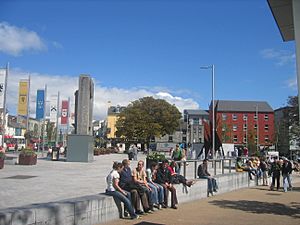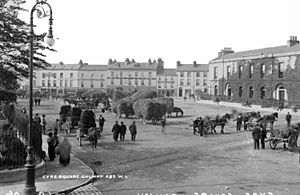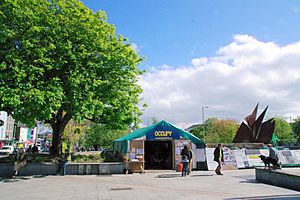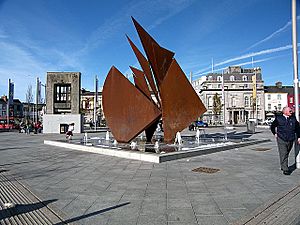Eyre Square facts for kids
| An Fhaiche Mhór | |
 |
|
| Other name(s) | John F. Kennedy Memorial Park |
|---|---|
| Namesake | Edward Eyre (mayor 1710–11) John F. Kennedy |
| Area | 1.2 hectares (3.0 acres) |
| Location | Galway, Ireland |
| Postal code | H91 |
| Coordinates | 53°16′28″N 9°02′56″W / 53.2745°N 9.0490°W |
Eyre Square (which in Irish is called An Fhaiche Mhór) is a famous public park in Galway, Ireland. It's also known as John F. Kennedy Memorial Park. You can find this park right in the city centre, close to popular shopping streets like William Street and Shop Street. The Galway railway station is also right next to the square.
Eyre Square has a rectangular shape. Three sides of the park are surrounded by busy streets that lead into Galway city. The west side of the square became a pedestrian-only area in 2006, meaning cars are not allowed there.
Contents
History of Eyre Square
Eyre Square started a long time ago as an open space in front of a town gate. People called it "the Green." It was a place where markets often happened, especially in the northern part.
The first time someone tried to formally enclose the space was in 1631. They planted some ash trees and put a wooden fence around the park. In 1710, Mayor Edward Eyre officially gave this land to the city. That's how the square got its name, Eyre Square.
In 1801, a general named Meyrick built a stone wall around the square. For a while, it was even called Meyrick Square. In the mid-1800s, the park was redesigned in a fancy Georgian style. Later, in the 1960s, a big reconstruction project began. Old iron railings were removed and moved to the backyard of St. Nicholas' Collegiate Church.
John F. Kennedy's Visit
In 1965, the square was officially renamed "John F. Kennedy Memorial Park." This was done to honor John F. Kennedy, who was the President of the United States. He visited Galway city and gave a speech in the square on June 29, 1963. He was the first U.S. president to visit Ireland while still in office. Even though it was renamed, most people in Galway still call it Eyre Square.
Occupy Galway Movement
Eyre Square was home to one of the longest "Occupy" camps in the world. It lasted for 216 days in a row! In October 2011, a small group of people from Galway were inspired by the "Occupy Wall Street" movement in the U.S. and Europe. These movements involved regular people setting up camps in public places. Their goal was to hold meetings, workshops, and discussions. They wanted to talk about social problems and find solutions to unfairness in society.
The people at the Occupy Galway camp wanted to show how wealth was divided. They believed that a small group of very rich people (the "1%") benefited from financial problems, while most people (the "99%") had to pay for them.
The camp was finally taken down on May 16, 2013. Police officers and city officials arrived early in the morning. They removed the people from the camp to prepare the square for a big sailing event called The Ocean Race, which was returning to Galway.
The next year, the people who were part of Occupy Galway held a one-day event. They wanted to remember when their camp was removed. They also ran a successful campaign to tell people about their event. Since then, there have been no more Occupy Galway events.
Statues and Attractions
Eyre Square has several interesting statues and attractions. Before the most recent changes to the park, there were two large cannons made of cast iron. These cannons were given to the city to recognize the brave service of the Connaught Rangers. This was an Irish Regiment that fought in the British Army during the Crimean War.
Memorials and Art
- A statue of the Irish language writer Pádraic Ó Conaire was put up in 1935 to remember him.
- There is a portrait bust (a statue showing only the head and shoulders) of U.S. President John F. Kennedy in the park.
- You can also find a statue of Liam Mellows (1892–1992). He was a hero of the Irish War of Independence. His statue is in the car park east of the Browne doorway.
The Browne Doorway
The Browne doorway is another special attraction in Eyre Square. This doorway was originally part of the Browne family's home on Lower Abbeygate Street. In 1905, it was moved from Abbeygate Street to Eyre Square. Recently, it has needed support and protection with plexiglass because it was getting damaged.
The Browne family's name is also on one of the fourteen flags near the Browne doorway. These flags represent the Tribes of Galway (Treibheanna na Gaillimhe). The Tribes of Galway were fourteen important merchant families. They were very powerful in the politics, business, and social life of Galway city from the mid-1200s to the late 1800s.
 | Mary Eliza Mahoney |
 | Susie King Taylor |
 | Ida Gray |
 | Eliza Ann Grier |




